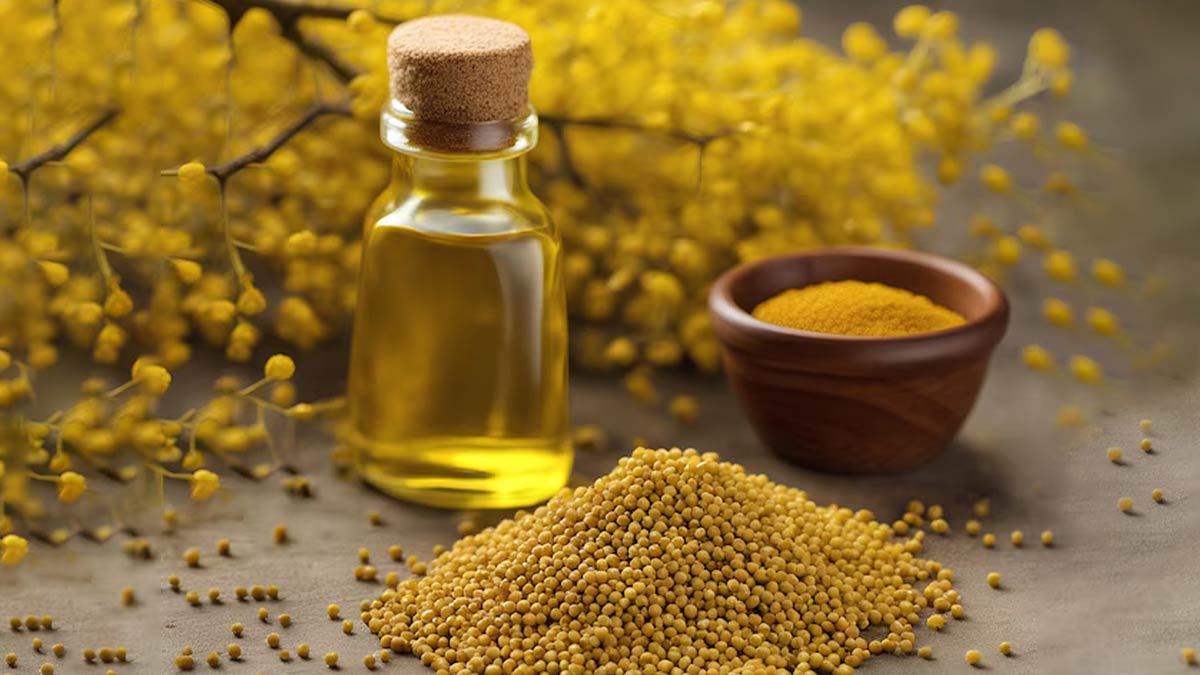
May it be a Punjabi or a Bengali one, mustard oil is a cooking essential in many parts of India. Mustard oil, a staple ingredient in many South Asian kitchens, is renowned for its distinctive flavour and numerous purported health benefits. However, despite its widespread use and cultural significance, mustard oil is banned for culinary purposes in the United States. This prohibition, rooted in historical and scientific concerns, has sparked debates among health experts, regulatory bodies, and culinary enthusiasts.
Table of Content:-
The primary reason for this ban is the high concentration of erucic acid found in mustard oil, which has been linked to potential health risks. In this article, we delve into the reasons behind the U.S. ban on mustard oil, exploring the scientific research, regulatory actions, and cultural implications that surround this controversial cooking oil.
The Composition and Health Concerns
Mustard oil contains a high concentration of erucic acid, a monounsaturated omega-9 fatty acid. Erucic acid, when consumed in large amounts, has been associated with adverse health effects, particularly on the heart. Studies linked high erucic acid consumption to the development of myocardial lipidosis in laboratory animals, a condition characterised by the accumulation of fat in heart muscles. This condition led to concerns that high levels of erucic acid could have similar effects on humans, potentially leading to heart damage.

The United States Food and Drug Administration (FDA) has stringent regulations when it comes to food safety. In the case of mustard oil, the FDA classifies it as an unsafe food additive due to its high erucic acid content. The FDA mandates that the erucic acid content in edible oils should not exceed 2%, while mustard oil can contain as much as 20-40%. This significant discrepancy led to the prohibition of mustard oil for cooking purposes in the US.
Also read: Is Mustard Oil Bad For Health? Read On To Know
Regulatory Actions and Labelling
The regulatory actions taken by the FDA are based on the precautionary principle, which aims to protect public health by erring on the side of caution. Mustard oil sold in the U.S. is labelled as "for external use only" and often comes with a warning that it is not intended for human consumption. This labelling is intended to prevent consumers from using it as a cooking oil, aligning with the FDA's stance on the potential health risks associated with erucic acid.
Additionally, mustard oil's association with contamination issues has contributed to its controversial status. Instances of adulteration with argemone oil, which can cause epidemic dropsy, a disease characterised by swelling, glaucoma, and heart failure have been reported. This further reinforces the FDA's cautious approach towards mustard oil.

Contrasting Perspectives and Cultural Significance
Despite its ban in the US, mustard oil continues to be a cherished culinary ingredient in many cultures, particularly in South Asia. It is celebrated for its distinctive pungent flavor and is believed to have several health benefits, including anti-inflammatory and antimicrobial properties. Traditional Indian cuisine relies heavily on mustard oil for its unique taste and potential health benefits, from promoting cardiovascular health to boosting immunity.
Also read: Mustard Seeds: Health Benefits, Side Effects And Nutritional Facts
Supporters of mustard oil argue that the studies leading to its ban are outdated and that further research is needed to understand the actual impact of erucic acid on human health. They point out that millions of people have consumed mustard oil for generations without apparent widespread harm. Advocates also highlight the need for regulatory bodies to consider cultural contexts and traditional dietary practices when making decisions about food safety.
Conclusion
The ban on mustard oil in the U.S. is a complex issue rooted in scientific research, regulatory policies, and cultural differences. While the high erucic acid content raises legitimate health concerns, the cultural significance and historical usage of mustard oil suggest that the conversation is far from settled. As scientific understanding evolves, there may be opportunities to revisit and re-evaluate the safety of mustard oil, potentially leading to regulatory changes that balance safety with cultural practices. Until then, mustard oil remains a beloved yet contentious ingredient, celebrated in some parts of the world and restricted in others.
Also watch this video
How we keep this article up to date:
We work with experts and keep a close eye on the latest in health and wellness. Whenever there is a new research or helpful information, we update our articles with accurate and useful advice.
Current Version